#'from the river to the sea' is no more a call for jewish genocide
Explore tagged Tumblr posts
Link
IN RECENT WEEKS, as Palestinians rose up in their homeland, in the wider Middle East, and around the world, you probably heard the slogan “from the river to the sea, Palestine will be free.” In cities across the globe, protesters responded to the pending expulsions of Palestinian residents from their homes in Jerusalem, Israeli attacks on holy sites, and the bombardment of Gaza. If you watched or attended any of these protests, you likely saw the slogan printed on a sign, or heard it drifting over the crowd.
You may also have heard claims that this slogan is antisemitic or even genocidal. On May 19th, for example, the New Yorker Union was widely attacked for tweeting, “Solidarity with Palestinians from the river to the sea who went on a 24-hour strike yesterday for dignity and liberation.” Whether in earnest ignorance or in bad faith, critics of the river-to-the-sea formulation argued that the union, and others who used the slogan last month, were implicitly calling for not only dismantling the State of Israel, but cleansing the entire region—from the Jordan River to the Mediterranean Sea, an area encompassing the West Bank, Gaza, and all of Israel within its internationally recognized pre-1967 borders—of its Jewish population. (Unfortunately, the union backed down in the face of these smears.)
Like many Palestinians, I’ve long used this phrase. About a decade ago, Peter Beinart started a blog at The Daily Beast called “Open Zion” aimed at bringing together a range of perspectives on Israel/Palestine. He invited me to participate regularly, and at first I was hesitant, given the name. Would a project called “Open Zion” really be open to arguments that challenged the tenets of Zionism? I agreed to participate on the condition that I could write what I wanted and that my column could be called “From the River to the Sea.” As I explained to Peter, I wasn’t concerned with Israel’s identity crisis over whether it could be both Jewish and democratic; I was concerned that Palestinians were being denied basic rights throughout their homeland. My column, “From the River to the Sea,” would be focused on the unity of the Palestinian experience and how all Palestinians faced a shared struggle with Zionism regardless of where they lived.
Today, I believe the conversation has increasingly shifted in this direction. This is due in part to a general intellectual and moral awakening—in media, in academia, in activist spaces, and even among certain elected officials—on the subject of Israel/Palestine, but also because of the increasingly horrific realities on the ground. More than ever before, people around the world are accepting that the problem goes well beyond the occupation of the West Bank, and that discrimination against Palestinians occurs on both sides of the Green Line.
The recent Palestinian uprising foreshadowed a future struggle in which the Green Line is unimportant if existent at all, because across the country, Palestinians mobilized collectively on a large scale under their national banner. The phrase “from the river to the sea” captures this future as no other can, because it encompasses the entire space in which Palestinian rights are denied. It is in this space that Palestinians seek to live freely. It is across this space—and across the political and geographic divisions that Israeli rule has imposed—that Palestinians must unite to create change. It is this space that Palestinians call home, regardless of what anyone else calls it.
“From the river to the sea” is a rejoinder to the fragmentation of Palestinian land and people by Israeli occupation and discrimination. Palestinians have been divided in a myriad of ways by Israeli policy. There are Palestinian refugees denied repatriation because of discriminatory Israeli laws. There are Palestinians denied equal rights living within Israel’s internationally recognized territory as second-class citizens. There are Palestinians living with no citizenship rights under Israeli military occupation in the West Bank. There are Palestinians in legal limbo in occupied Jerusalem and facing expulsion. There are Palestinians in Gaza living under an Israeli siege. All of them suffer from a range of policies in a singular system of discrimination and apartheid—a system that can only be challenged by their unified opposition. All of them have a right to live freely in the land from the river to the sea.
But it is precisely because Zionist settler colonialism has benefitted from and pursued Palestinian fragmentation that it seeks to mischaracterize and destroy inclusive and unifying rhetorical frameworks. For example, journalist Marc Lamont Hill was attacked and ultimately removed from his position at CNN for calling for Palestinian freedom “from the river to the sea.” After all, it is far easier to dominate a divided people fighting different battles on different fronts than it is to dominate one people united in a single battle for the same universal rights.
Since Zionists struggle to make a persuasive argument against freedom, justice, and equality for all people throughout the land, they seek instead to attack the message and messenger. When Palestinians proclaim “from the river to the sea, Palestine will be free,” many Zionists argue that this is a Palestinian call for genocide. But as historian Maha Nassar has noted, there has never been an “official Palestinian position calling for the forced removal of Jews from Palestine.” The links between this phrase and eliminationism might be the product of “an Israeli media campaign following the 1967 war that claimed Palestinians wished to ‘throw Jews into the sea.’” Jewish groups such as the American Jewish Committee also claim that the slogan is antisemitic because it has been taken up by militant groups such as the Palestine Liberation Organization, the Popular Front for the Liberation of Palestine, and Hamas. But as Nassar writes, the phrase predates these uses, and has its origins as “part of a larger call to see a secular democratic state established in all of historic Palestine.”
The claim that the phrase “from the river to the sea” carries a genocidal intent relies not on the historical record, but rather on racism and Islamophobia. These Palestinians, the logic goes, cannot be trusted—even if they are calling for equality, their real intention is extermination. In order to justify unending violence against Palestinians, this logic seeks to caricature us as irrational savages hell-bent on killing Jews. Nor does the attempt to link Palestinians to eliminationism stop at the deliberate mischaracterization of this slogan; rather, it is deployed in many other contexts. In 2015, for instance, Israeli Prime Minister Benjamin Netanyahu engaged in Holocaust revisionism by stating that it was really a Palestinian, not Hitler, who inspired the final solution. Angela Merkel, the German Chancellor, actually had to remind the Israeli Prime Minister that it was the Germans who were responsible for the Holocaust. Raising the constant specter of eliminationism has political utility for Zionists; in such a threatening environment, perpetual abuses of Palestinians can be rationalized.
This twisted logic is not only reserved for Palestinians. Marginalized groups are often accused of not being trustworthy and of having deep-seated ulterior motives aimed at destroying society. Jews should know this trope well, as it has long been a central feature of antisemitism. In fact, the worst antisemitic attack in American history was carried out in recent years by a murderer who attacked a synagogue because he thought Jews were destroying white Christian-dominated society by bringing in brown immigrants under the guise of humanitarianism.
Fundamentally, such arguments disregard what Palestinians are calling for when they use the phrase in question: a state in which Palestinians can live in their homeland as free and equal citizens, neither dominated by others nor dominating them. When we call for a free Palestine from the river to the sea, it is precisely the existing system of domination that we seek to end.
(article dated June 11th, 2021)
#'from the river to the sea' is no more a call for jewish genocide#than 'black lives matter' is a call for white genocide#we say 'black lives matter' because historically and currently#policy makers and cops have made it clear that black lives do NOT matter to them#we say 'from the river to the sea palestine will be free' bc under historical and current israeli policies#palestine is NOT free#this isn't difficult to understand if you aren't TRYING to obfuscate the issue of palestinian liberation from oppression#ok maybe you've just heard off-hand that this is a call to genocide and swallowed it without much thought#that's fair#ignorance is forgivable#bad faith smears are not#and if you're reading this then now you know#free palestine#ceasefire now#current events#politics
22 notes
·
View notes
Text
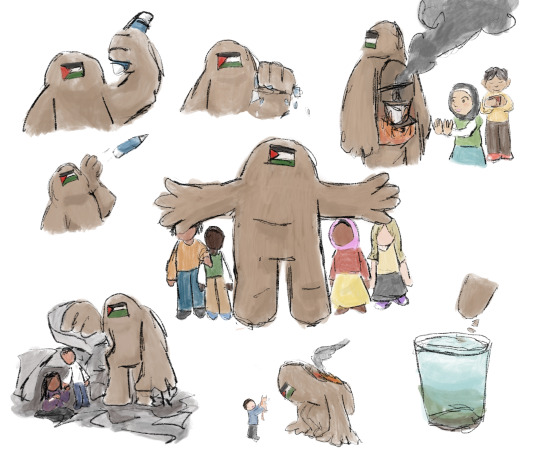
[ID: drawings of a golem animated by a palestinian flag painted on its forehead. it is seen: holding out its arms protectively in front of a crowd of children, the children also hold each other supportively; catching an air strike missile from the air and throwing it away or crushing it in its fist; turning its back so that a child can warm her hands by the earth oven built into its back, food in a pot is cooking on the fire and a boy holds a cup of steaming tea to his face and enjoys the aroma; clearing away rubble so a man can help up his wife who was buried underneath, she is clutching a baby to her chest; stooping down to look at a kitten a young boy is holding up to show it; and dissolving small flakes of clay from its finger into a glass of water, purifying it. end ID]
@fairuzfan asked people to create and share art for the strike. i wrote an artist statement and then set about trying to draw what i envisioned. artist statement below.
This golem is a protector that I wish I could gift to the children and adults in Gaza. The flag on its forehead is to show that love for the Palestinian people is an animating force for people fighting for a free Palestine all over the world, especially for those in Palestine who are trying to free themselves and their people. Love is the motivation for the call for a free Palestine, not hatred like people try to claim. It is very strong and fast and can catch air strikes out of midair and crush them to dust or throw them back in the direction they came from. It can lift all the rubble of a collapsed building very quickly so nobody can get trapped underneath. It has an earth oven in its back with an ever-burning flame that people can use to warm themselves and cook food and heat water to use to bathe themselves or make tea. Pieces of its clay can be crumbled up and mixed into water to make even the most brackish and unclean water pure and safe to drink.
The golem is always a bit of a tragic figure so I don't imagine it staying around forever once Palestine is free and it is no longer needed. I think it would use its great strength to help rebuild the destroyed houses, churches, schools, universities, hospitals, and mosques and then dive into the Jordan river and dissolve. It would clean the river of all pollution and make the water splash up over all the newly replanted fruit trees, causing them to grow big and strong. Its love for Palestine and its people can be tasted in the fruit they grow for generations.
I choose a specifically Jewish icon of protection because of how it feels to witness such horrors done in the supposed name of Judaism and the Jewish people. For many anti-zionist Jews, we feel like we are acting directly within the teachings of our stories and communities by opposing this genocide. It is difficult to understand how the very people and institutions who taught us these values now fight against them so fiercely. While obviously I would still oppose Israel were I not Jewish, the way I oppose Israel is directly informed by my Jewishness. I hope that someday, somehow, Judaism can bring as much joy and support to the Palestinian people as it has brought grief and destruction. That Jewish symbols used in the name of love and justice will bear more significance than the ones used in shows of hatred. Knowing the depth of the harm caused, I do not know if this is possible. But this artwork and everything I have dedicated myself to these past few months and continue to dedicate myself to in the future is born from this hope. I love you. Thank you for being on this planet with me. From the river to the sea, Palestine will be free! And it will be beautiful.
8K notes
·
View notes
Text
Zionists kill judaists, how much more antisemitic can they get?
The "only democracy in the Middle East", everyone.
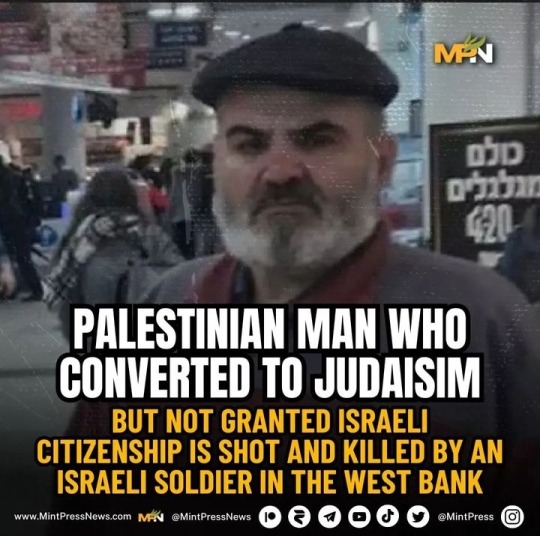

Link to post
End the Occupation! Free Palestine!
#free palestine#palestine#gaza#from the river to the sea palestine will be free#none of us are free until all of us are free#save the children#human rights for all humans#zionism is naziism#zionism is antisemitic#zionism causes antisemitism to real judaists#conflating zionism with judaism is the real antisemitism#judaism doesn't support genocide but zionism does#'israeli hostage' means 'hamas' in zionist#'starving children' means 'hamas' in zionist#'doctor' means 'hamas' in zionist#'press' means 'hamas' in zionist#hamas is just the excuse they use to do what they really want: genocide palestine#bro there were so many hamas in there bro#trust me bro#if my kid was in the rubble id be hamas too#dont act like nazis if you dont want to be called nazis#israel is a terrorist state#the us is a terrorist state#biden supports this#biden is a fake christian#biden is netanyahus puppet#fuck butcher biden#genocide joe#fuck israel#can't get more antisemitic than killing Jewish ppl
9K notes
·
View notes
Text

From the River to the Sea collects personal testimonies from within Gaza and the West Bank, along with essays and interviews that collectively provide crucial histories and analyses to help us understand how we got to the nightmarish present. They place Israel’s genocidal campaign within the longer history of settler colonialism in Palestine, and Hamas within the longer histories of Palestinian resistance and the so-called ‘peace process’. They explore the complex history of Palestine’s relationship to Jordan, Egypt, and the broader Middle East, the eruption of unprecedented anti-Zionist Jewish protest in the US, the alarming escalation in state repression of Palestine solidarity in Britain and Europe, and more. Taken together, the essays comprising this collection provide important grounding for the urgent discussions taking place across the Palestine solidarity movement.
2K notes
·
View notes
Text
So, I saw you mention from the river to the sea being antisemitic. I’ve heard various people claim it had antisemitic origins but was never able to find reliable corroborating messages and was curious if u could elaborate on that more, if that’s why. The other argument I’ve heard is it being coded for “free from the jews” which. Yk. I definitely know there are some people who say it with that intent. But I am skeptical of insisting that implication is Always present to people who have found it a useful slogan to rally around on this issue without evidence backing up that intent in the original popularization of the slogan or that it has been widespread deliberately used with that meaning for a long time. Given your whole historian business I don’t doubt that you DO have solid reason for saying it’s antisemitic, I’d just love to hear the details.
I'm going to copy and paste what I wrote about this in an earlier post, because that's still my response:
"That phrase contains strongly genocidal undertones with regard to the Jewish population of Israel who were forced to settle there after being ethnically cleansed from their homes across Eurasia and North Africa over the course of the 20th century (many of whom were and continue to be treated like shit by that country's government and don't get me started on the Yishuv's treatment of Holocaust survivors).
More than half of the Jewish population of the world lives in Israel. As an American Jew and a Holocaust historian keenly aware of the circumstances regarding the postwar Jewish peopling of the modern State, I am deeply uncomfortable with seeing that phrase in my intellectual space. Free Palestine, yes; work towards equal rights for Arab and Palestinian citizens of Israel, yes; engage in active reparations for Palestinians who had their property actively stolen from them in 1948, yes; Truth and Reconciliation Commissions, yes; but not on the bodies of half of the 15 million Jews who remain on this planet."
There is no Collective Jewish Take on this, because Jews are not a hivemind. But it is my take, as a Jew, and as a Holocaust historian.
Jews across any political spectrum will be extremely sensitive to ANY language which reads to us incitement to ethnic cleansing, because we've been ethnically cleansed from all regions of Eurasia over the course of our ~3000 year history. A lot of Palestine activists don't want to engage with that and really resent being told that they need to. And like, I get it; I get their frustration, resentment, rage, and righteous indignation. But the Jewish pasts, and Jewish knowledge of our tenuous ongoing existence on this planet; those aren't going to go away just because it complicates rhetoric on the Israel/Palestinian Conflict.
People can keep using "from the river to the sea." You can keep using it. I'm not the Language Police. Some Jews here and elsewhere may feel comfortable using it and being in spaces where it's used. I'm not going to shit on those Jews or call them "Kapos" or "Self-hating" or "pick-mes." But I'm also not going to change my opinion or my analysis, or ever be comfortable with its use in my intellectual space.
211 notes
·
View notes
Text
The "Free Palestine" movement is genocidal. Straight up. It's not just a few select slogans they use or some fringe members.
The very name of the movement is genocidal.
I had a conversation with my former roommates last semester where they refused to understand why "Free Palestine" in and of itself as a statement is a problem.
To them, it's a liberation movement. But the first issue arises when we ask who or what is being liberated.
What, in modern geographical terms, is Palestine? Where is Palestine? Who is the ruling party of Palestine?
Anyone with even a bit of knowledge would realize that this is a trick question. There isn't any country actually called Palestine.
When people refer to Palestinians, they typically talk about the people either in Gaza or the West Bank, which are two separate entities with two separate governments.
So who are we supposed to be freeing? Gaza, which has its own government in the form of Hamas? Or the West Bank, which has the PA as its governing group? (By the way, the PA has this little thing called pay-for-slay I suggest you look into, but that'd be a post for another time.)
The actual term "Palestine" most commonly is used to refer to the entire area of where Israel, Gaza, and the West Bank are located.
Which brings me to my main point. When people call to "Free Palestine" they aren't calling for a two-state solution. Identically to their call for "from the river to the sea", this slogan calls for the complete destruction of Israel.
A lot of people have already spoken on the issue of why "from the river to the sea" is genocidal in nature, so I won't be going too in depth on that. My point is more so that those two phrases are equivalently malevolent in nature.
There's also the people who call themselves "pro-Palestine". If we take into consideration what "Palestine" as a term means, we're left with two interpretations.
First, they just use that instead of "Free Palestine", making their use of it still equivalent for wanting the entirety of Israel gone.
Second, they want Palestine to "win" in the war.
Now, since we've established that there isn't actually a country called Palestine right now, they're either rooting for the PA or Hamas to win.
As I recommended before, it'd be fantastic if you could just take time to read up on what pay-for-slay is. As a quick summary, that's exactly what it sounds like. The PA pays people money for killing Israelis/Jews. (That's the very vague version, since this isn't the point of the post.)
Therefore, you can probably imagine what would happen to Israelis if the PA were to take over Israel (G-d forbid).
If, G-d forbid, Hamas were to take over Israel, we'd end up with a series of atrocities akin to the horrors of Oct 7th. How do I know? Hamas leaders have repeatedly promised to repeat Oct 7th again and again and again.
Both the PA and Hamas have killed their own people for suspected collaboration with Israel, in rather cruel ways. So you can probably imagine what'd happen to Israelis in both scenarios.
I have seen very very few people who align themselves with either phrasing of the movement actually calling for two states, or for any viable solution. (And no, a ceasefire that leaves Hamas in power is not a viable solution. We had a ceasefire until the moment they attacked on Oct 7th.)
(I say "very few" as an allowance that some may exist, but in reality I haven't seen any.)
If your solution involves the dissolution of Israel and giving power to either the PA or Hamas, congratulations. You are actively backing a genocidal "solution".
And much like a previous "solution", most of the victims of this proposed genocide would be Jewish.
#jumblr#jewish#proud israeli#israel solidarity#antisemitism#israel#israel hamas war#i stand with israel#am yisrael chai#hamas is isis#hamas and the pa both want to just kill jews and have said so and acted on it before
674 notes
·
View notes
Text
Just a reminder: intent is much, much more important to genocide than the amount of people dying. simply put, the amount of dead civilians isn't what makes a genocide a genocide.
for example, up to 33k bosnians are estimated to have died because of the bosnian genocide. in contrast, the estimated amount of japanese civilians dead during WWII is between 330k and 900k. yet most (serious) people wouldn't ever consider that there was a genocide against the japanese people. why? well, no government wanted to, planned or carried out systematic attacks with the intent of erasing, in whole or in part, the japanese people. yet, however, it is fairly easy to prove that the serbs wanted the bosnians gone and acted accordingly. You can even fullfill the material criteria for the Genocide Convention (ie killing people, or causing body or mental harm to a population) to a certain extent but if the intent behind those actions isn't to destroy a national/ethnic/etc group, then it's not genocide, the fullfilment of the material elements themselves aren't proof that there's a genocide without fullfilment of the mental element.
This isn't to overlook civilian deaths, but truth is, in modern warfare, civilians ARE gonna die, and that sucks massively, but we have a a whole branch of international law that help mitigate a lot of civilian deaths and allow for criminals to be held accountable for violation of civilian rights and livs, without having to erroneously call every single conflict where people die a genocide.
Similarly, it may be true that a lot more people are dying in the Israel-Gaza war than in the 7/10 attacks, but why did Hamas attack Israel in the first place? Why has Israel been attacked fairly frequently since it's independence? Because they want to completely erase Israel as a whole and expel (and kill, or best case scenario, convert) the jewish people out of the Middle East. This is very easy to prove, read Hamas founding charter and literally any history book that talks about wars against Israel or the expulsion of Jews from several ME countries. It's what the whole "from the river to the sea" slogan is about. It's also the very reason Israel needs to exist. But meanwhile, there's little to nothing that points out Israel wants to wipe out Palestinians as a group: 20% of their citizens are Palestinians who enjoy the same rights as Jewish citizens of Israel and aren't targeted, even Palestinians of the West Bank aren't usually targeted in a way that would even imply the IDF wants to erase them as a group, and even considering the Gaza campaign, its objective is to erradicate Hamas, not Palestinians, and nothing in Israel's policy outwardly implicates they want to erradicate all Gazans. Palestine, and especially Gaza, has massive population growth, which wouldn't make sense if there was a genocide campaign against them. This isn't to say the IDF is doing everything perfectly or that there aren't war crimes being commited. But war crimes don't mean genocide.
Calling what's happening in Gaza genocide is antisemitic, because not only are we applying different standards to Israel than we do any other country, we are also saying that Jewish people defending themselves is, inherently, a crime, one of the worst crimes defined at that. But it's also harmful to palestinians, because claiming that Israel's war against Hamas is a war against Palestinians equates Palestinians (many of whom just want to live regular lives, not war) with terrorists (who also target them, by the way), which seems islamophobic as hell if i'm being honest. it is also insensitive and damaging to every group that has been the victim of genocide, and every group which might be a victim of a genocide in the future, because how you're twisting the definition of the word to mean whatever you want it to mean. If everything is a genocide, nothing is.
#sincerely an IR major tired of people not knowing what words mean#i stand with israel#i stand with palestine#israel#israel gaza#palestine#hamas#israel palestine#genocide#hamas is isis#free palestine#free palestine from hamas#antisemitism
456 notes
·
View notes
Text
There is a version of “Free Palestine” that is simply a call for Palestinian Independence—no more expansionist settlements, an end to sanctions & blockades, a renegotiation of borders between Israel & Palestine, international recognition of Palestine, water rights, unfettered access to energy & other utilities, freedom of movement, etc.—and I think this is what a lot of Anti-Zionists have in mind when they say it.
There is another version which imposes on Israel-Palestine a framework that characterizes any and all Jewish presence “from the river to the sea” as an occupation, and the entire region’s population of Jews as “settler-colonizers”. I think this is a very dangerous way of characterizing Jewish existence in the Levant, because if any and all Jews in the region are inherently “Zionist colonizers”, then any “decolonization” will de facto just be dejudification—the removal or death of Jewish people and Jewish culture. This would be, at best, an ethnic cleansing—at worst, a genocide.
“From the river to the sea, Palestine will be free” is a slogan that really seems to presuppose the latter framework and makes little sense outside of it; thus, it’s hard to hear as anything other than a call to either ethnically cleanse or genocide Israeli Jews.
This is why many Jews are scared right now—even ones who are not Pro-Israel and who’ve been highly critical of Zionism for a very long time (hi that’s me). Because we are seeing our neighbors sign onto the goal of dejudification, and repeating slogans that call for the ethnic cleansing & genocide of our people.
And many Anti-Zionists will be quick to push back against this by saying “Well, no, we don’t hate all Jews, just Zionists”. The problem with that is that many of y’all are labeling all Israelis “Zionists”, any Jews outside of Israel who mourn their deaths “Zionists”, any Jews who point out antisemitism or make any criticism of anyone but Israel “Zionists”, any Jews who acknowledge that Jews are indigenous to the Levant or that pogroms were a huge motivating factor in Zionism “Zionists”; there are almost definitely going to be people reblogging or commenting on this post to call me a Zionist. Even if you just pare that down to only Israeli Jews, that’s about half of all Jews on the face of the planet you believe deserve to be ethnically cleansed.
“I don’t hate all Jews, just most of them” and “I hate 7 million+ Jews, but not for being Jewish, just for being part of a distinctly Jewish ideology” is not the progressive take you think it is. It is, in fact, just antisemitism.
#and I would love to be proven wrong on the people calling me a Zionist on this post part but like#someone has done that on pretty much every nuanced i/p no matter how much I criticize Israel once it gets past a certain number of notes#i/p#jumblr#antisemitism#cw antisemitism
798 notes
·
View notes
Note
Genuine question: where have there been protests with nazi flags? Out of all the images ive seen its been all palestinian flags and supportive messaging. There haven’t been antisemetic dog whistles in the photos/videos i have seen?
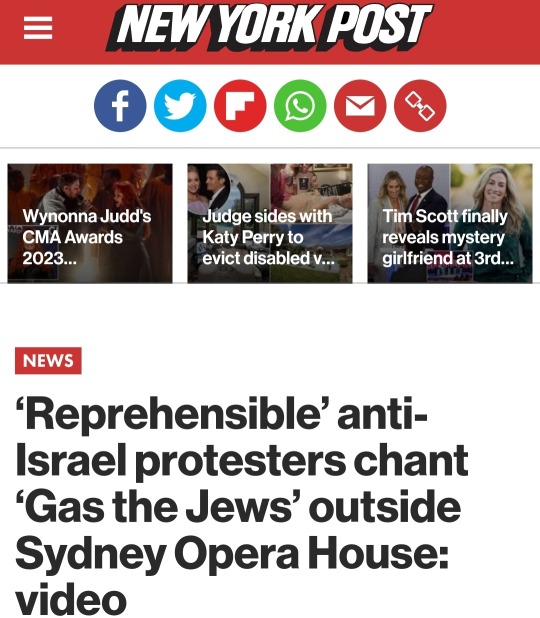
X
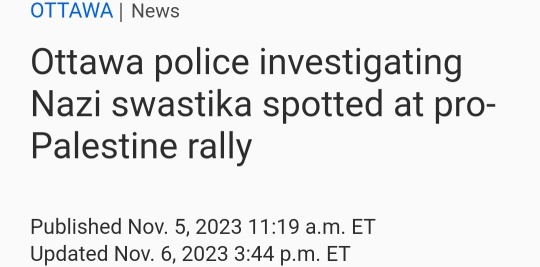
X
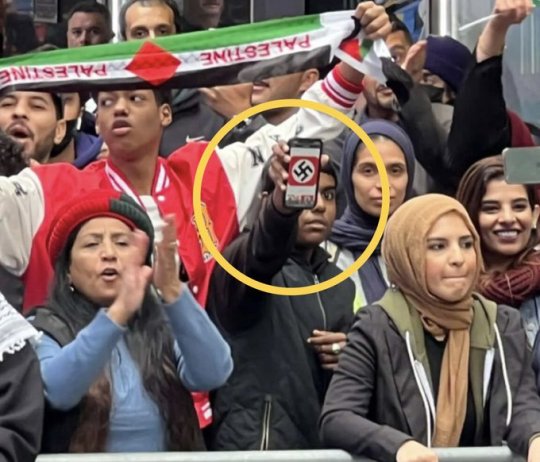
In Times Square

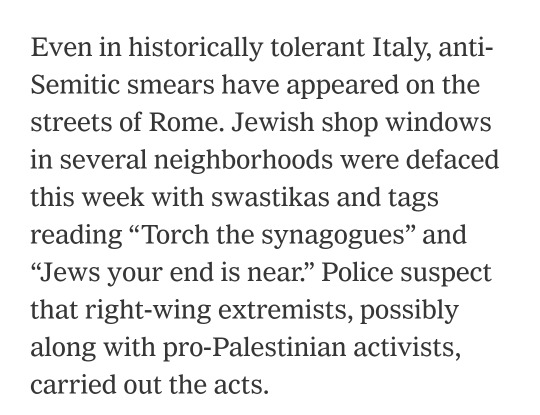
Paris
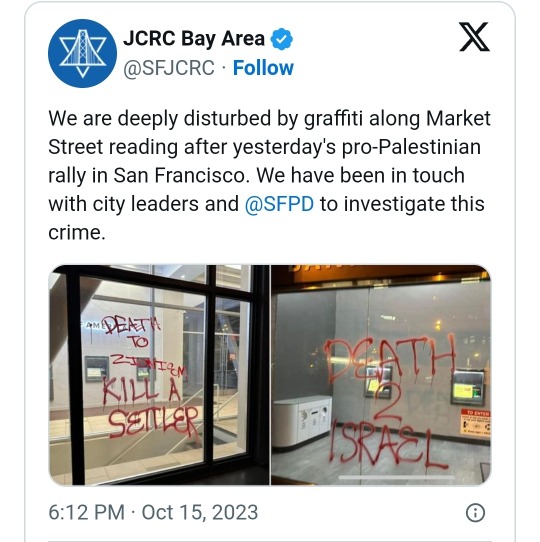
X

X
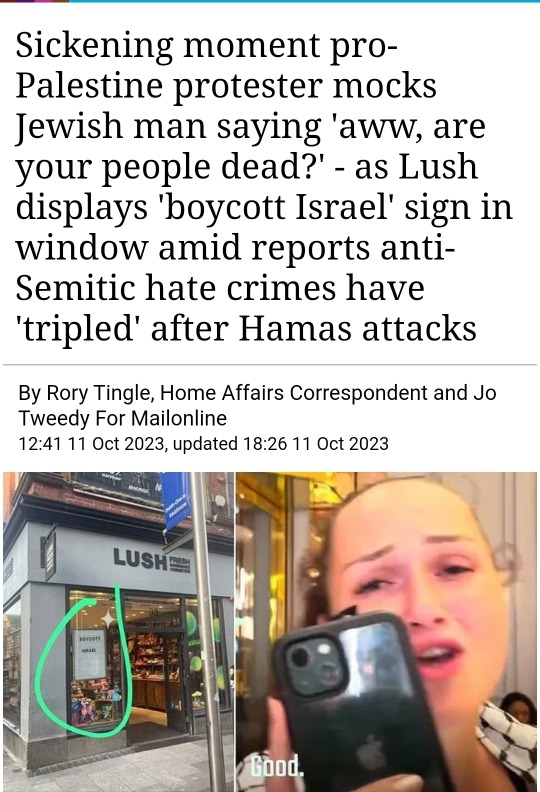
X
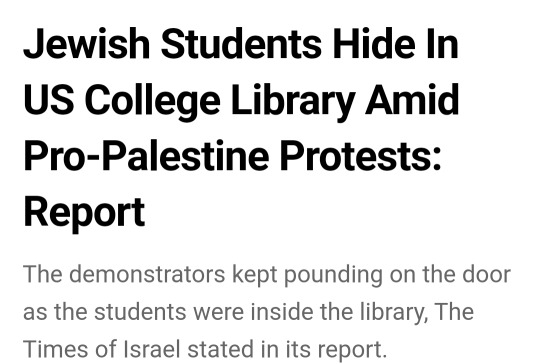
These students were chased into the library and forced to hide while the protestors banged on the doors and windows.

X
Tumblr won't let me add more but yeah they're not peaceful. I have a million other photos and videos of Jewish stores being vandalized, synagogues being attacked, Jewish people being beaten or chased by pro Palestine protestors. The protests are anything but peaceful.
Also their favorite chant "From the river to the sea" is a call for Jewish genocide. Same with their chant "Khaybar khaybar ya yahud". Khaybar was a massacre against Jews by the prophet Mohammad and that chant is saying "Jews, remember Khaybar". Its a threat.
660 notes
·
View notes
Text
I have friends and family very concerned about the “from the river to the sea” chant, but most commentators I respect online support it, so I did a bit of research and this is the best article I found explaining it. Surprise surprise, the hegemonic narrative my friends and family had absorbed was wrong.
“From the river to the sea” is a recognition that apartheid began in 1948 when Israel was created through the ethnic cleansing of Palestine. It is no call for genocide. To call for the destruction of Israel as an apartheid state is not a call for the destruction of Jews living there, any more than the call for the destruction of apartheid in South Africa was a call for the destruction of white people.
…
Historically the slogan “from the river to the sea” dates at least as far back as the 1960s when the Palestinian resistance was led by the Palestine Liberation Organisation (PLO), a secular coalition of Palestinian nationalist and leftist parties.
In the late 1960s, the PLO put forward a visionary idea of Arab-Jewish coexistence in one democracy, arguing for Israel and the Occupied Territories to become “one secular, democratic state of Palestine” based on one person, one vote, where Arabs, Jews, Muslims and Christians would enjoy full equality.
#palestine#israel#from the river to the sea palestine will be free#from the river to the sea#colonialism#settler colonialism
451 notes
·
View notes
Text
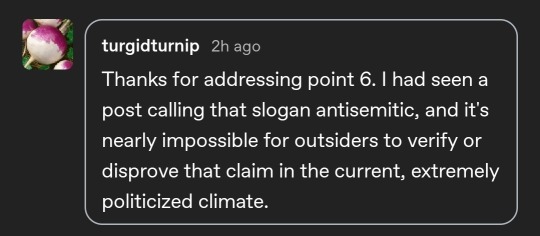
@turgidturnip I hope you don't mind me replying to this on a different post.
This is about "from the river to the sea" and the claim that it's an antisemitic rallying cry, calling to ethnically cleanse Palestine from Jews.
There's a misconception that this slogan comes from the Hamas charter, but it predates Hamas by, I think, a couple of decades. It's been used this way by more militant groups, and by Iraqi leadership at some point, but before that it's been used to call for a democratic secular nation state.
The reason you see these claims of antisemitism from Jewish people online is that this is the context where most of them will have seen it. Both because it is part of the history, and because that's how antisemites use it against Jews.
Both "Free Palestine" and "from the river to the sea" are thrown at random Jewish people, who are completely unrelated to Israel, to tell them essentially "You're not wanted anywhere and we want you gone."
This abuses the cause of the Palestinian people to weaponize against Jews. It's wrong and violent, but doesn't make the desire to be free in their homeland into something genocidal. And I'm not willing to just give antisemites this, but even if I was, I'm not Palestinian and giving up on a slogan because antisemites are abusing it is not my call to make. It's pretty obvious Palestinians don't want to put it away. Any slogans Palestinians might create can be used this way against Jews, because antisemites will always look for ways to be hateful towards us. But it doesn't make the antisemitism inherent in the desire for freedom.
Recognize where it's used in an antisemitic way from context: if someone uses those slogans to throw at a random Jewish person, or if it's used to disrupt a conversation about antisemitism, that's a misuse of it that does a disservice to Palestinians in favor of harming Jews. That's when it has genocidal intent applied to it.
Otherwise, don't let antisemites steal a slogan of a group of people who have been facing ethnic cleansing for over seventy years. Their real ethnic cleansing takes priority over the hypothetical one we're supposedly threatened with.
I'm not trying to tell other people what their liberation should look like. But when I talk to Palestinians, so far what I heard was a desire for one state that isn't an ethnostate. A civic state that tries to be safe for all the people within its borders. As far as I could see, Palestinians have been saying for a while that what they mean by this, is a state that will be free and equal to everyone.
The assumption that Palestinians will pull some sort of reverse ethnic cleansing against us is racist. And this assumption is the reason Israelis feel comfortable calling the carpet bombing of a civilian population "self defense." Killing them based on this is not self defense, it's a racially motivated crime against humanity.
Gaza is experiencing a genocide. This is because Israel wants the land - without the people. The manufactured Jewish majority can't be sustained if they're made equal citizens. Palestinians are risking the ethnostate by being alive.
So far Israel is the one practicing the genocidal interpretation of "from the river to the sea."
Palestinians deserve to be free on every single part of this land.
370 notes
·
View notes
Text
Daily update post:
A pro-Israel protester, 69 years old Paul Kessler, who suffered a hit to the head on Sunday during an altercation with an anti-Israel protester, passed away the next day from his injuries. His death was determined a homicide caused by blunt head trauma. There are differing accounts on what happened, but one friend said Paul wasn't ever violent, while more than one person mentioned he was hit on the head with a megaphone by the anti-Israel protester. There is footage of an anti-Israel protester continuing to chant slogans next to the blood stains on the ground, even as a police officer asks him to step away from what at that point was an active crime scene:
The Jewish community is asking for anyone with footage of what happened to send it in. Police says it will look into the angle of this being a hate crime. This is the last pic of Paul before the altercation:

Someone decided to test whether people actually understand what they're supporting, when they're supporting Hamas:
instagram
Now that the IDF is controlling the main road from northern to southern Gaza, it took out Hamas' blockades, and it announces daily when Palestinians can move on this road to the south, to a safer area. This means more Palestinians are evacuating the war zone. Hamas has instructed people NOT to spread the footage showing that this passage southwards is safe.
Many Hamas terrorists who were caught alive in Israel's territory after the massacre, had been arrested and interrogated. The other day, for the first time, two Hamas terrorists who were among the perpetrators of the massacre and had fled back to Gaza, were caught by the IDF, arrested and brought to Israel for interrogation.
While Hamas continues to fire rockets without stop at Israel, the daily number has decreased. Analysts estimate that this is thanks to the IDF's extensive activity in Gaza.
Since the debate over whether the chant "From the river to the sea, Palestine will be free" is genocidal, a lot of Arabic-speaking Israelis have started pointing out that the original version in Arabic explicitly states, "From the water (river) to the water (sea), Palestine will be Arab" which is at the very least a call to ethnic cleansing.
instagram
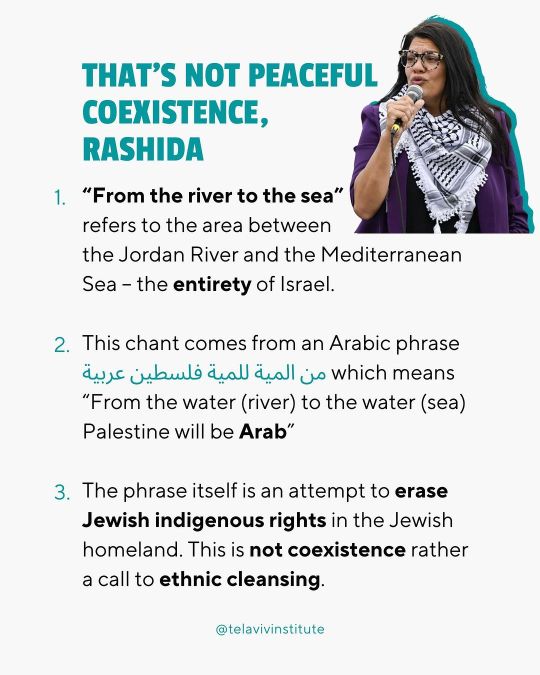
Yarden Haskin's husband, Alon Maor, came to visit him at his army base. A friend took this picture of them:
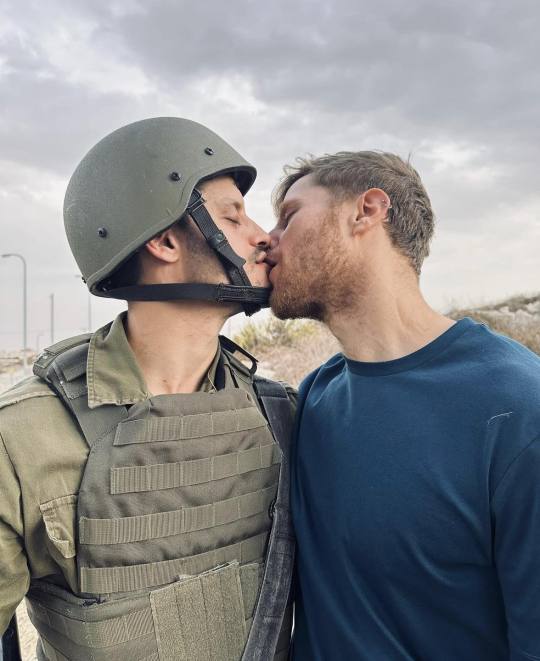
Yarden decided to send it to an Israeli journalist (from a religious background), who has been publishing pics and stories sent to him by regular Israelis. The pic went viral, Yarden and Alon have been interview for TV news (Yarden from his army base, Alon from home), and friends even shared some of their wedding pics:




(for all of my updates and ask replies regarding Israel, click here)
#israel#israeli#israel news#israel under attack#israel under fire#israelunderattack#terrorism#anti terrorism#antisemitism#hamas#antisemitic#antisemites#jews#jew#judaism#jumblr#frumblr#jewish#Instagram
226 notes
·
View notes
Text
Saw one of those posts that tries to launder Zionism in as "critiquing leftist antisemitism" go like:
NOT antisemitic: [milquetoast criticism of Israel that allows it to whitewash it's violent colonial history]
ANTISEMITIC: [normal anti-Zionism] [more normal anti-Zionism] [deliberate misinterpretation of anti-Zionism used to shut down discussions of decolonizing Palestine]
Here's a better guide:
Not antisemitic:
Acknowledging the Palestinian people's right to life, safety, and self determination throughout the entirety of the region of Palestine from the Jordan River to the Mediterranean Sea
Wholly condemning the Zionist project, which requires settler colonialism and ethnic cleansing to accomplish it's goal of establishing a Jewish state
Calling Israel's treatment of the Palestinian people what it is: genocide
Calling the state of Israel what it is: a settler colony
Calling out Israel's roll in upholding global white supremacy
Calling out western politicians and media for their support of Israel in upholding white supremacy
Calling out Zionist orgs like the ADL which conflate antisemitism and anti-Zionism, diluting the meaning of antisemitism in the process
Antisemitic:
Conflation of Israel or Zionism with Jews and Judaism
Any calls for violence against Jews as a people
Conspiracies of Jews controlling world governments, finances, or media
Denial of the Holocaust and other antisemitic violence
Hateful caricatures of Jews featuring exaggerated features and character traits associated with Jewishness such as large noses, greed, and deceptiveness
Blood libel: baseless conspiracies of the kidnapping/ritual sacrifice of non Jewish children by Jews
Calls for the expulsion or extermination of Jews in any nation
Claims of collective responsibility for the actions of Israel shared by Jews globally
I will not respond to bad faith additions, feel free to add anything I might've missed.
204 notes
·
View notes
Note
hey, if my ask is insensitive or simply too much work/you dont want to give your opinion/energy thats ok, and im sorry for bothering you if it is. ive seen many jewish people say "from the river to the sea" is a dogwhistle/generally antisemitic phrase to use, but you used it in your golem art's text part(incredibly moving text btw.) im asking you bc you mentioned youre jewish and i thought you might have insight or thoughts to give on why you use it/what you think about the first statement about the phrase?
hi, yes, i would be glad to talk about my perspective on this! first of all, i do want to say that i think a lot of palestinian bloggers have already talked about this and their voices will always be what you want to seek out first when educating yourself. however, i do know the crowd of people claiming that "from the river to the sea" is antisemitic/genocidal has been very loud so i understand why you would want to hear a jewish perspective on it too. second, in order to explain why i think "from the river to the sea" is not antisemitic will involve me comparing it to actual antisemitic, nazi slogans and dogwhistles and talking about what they mean. so just a heads up for that before it comes up.
the full phrase is "from the river to the sea, palestine will be free!" i think a lot of times in accusations of antisemitism people leave off the second half of the phrase in order to claim it is calling for something else to happen from river to sea (like the expulsion or execution of all jews.) but that's just like, not, ever, a thing? that is said? you can tell the pieces of the phrase go together because they rhyme and also are said together by palestinians and allies near constantly. it's "from the river to the sea, palestine will be free." and i think all of the fearmongering relies on a good bit of ambiguity beyond that too. "what does a 'free palestine' mean? could it meant they want to throw all the jews into the sea?" - some zionist when i tried to look up the origin of the phrase in case there was anything really important i was missing that i should cover in this. there's like this idea that they can't really be asking for a free palestine, there has to be some kind of catch.
i think it's also important to look at the circumstances that this slogan was born under. the thing about modern day palestine and occupied palestine, on which israel tries to build itself, is that even though spatially the land stretches from river to sea, the people's experience of it does not. because of the apartheid system of checkpoints, ID-based restriction of movement, and blockades (in the case of gaza), there exist great gulfs in the land that are impossible or near impossible for people to cross. there can be a place a couple miles away, that due to lacking the "proper credentials", is more distant for palestinians living under apartheid than perhaps a destination a cross-country trip away would be for you. so i see the call for a free palestine specifically "from river to sea" to remove those gulfs and allow freedom of movement for everyone. i find very little of this has to do with jews, personally. the only connection is that the people who set up and maintain this system of apartheid happened to be jewish. and i hope that we would all agree that resisting one's oppressors- even if those oppressors are also marginalized and oppressed in other ways- is not a bad thing.
but it is true that many white supremacist/antisemitic slogans may focus more on the creation of a (white) nation than actually the jews themselves, since they have already established among themselves that a white nation has to mean no jews. so let's look at some of the more famous nazi rallying cries and how different they are from "from the river to the sea."
the fourteen words are most primarily known to be "we must secure the existence of our people and a future for white children." wow! i guess we could find some superficial similarities between this and river and the sea, like if we really wanted to stretch it. but personally, there's a ton of alarm bells in my head that this phrase sets off while river to the sea doesn't. the emphasis of "we" and "our" when used in this way really implies an us versus them narrative. and here the ambiguity really is present and malevolent! a "free palestine" is a palestine unrestricted by apartheid and colonialism. a "secure existence" and "future for white children" is uhhh, what does that Mean. like, we Know what that means right. but they aren't saying it. we can very easily find people saying what a free palestine means if we listen to palestinians. please, please listen to palestinians. there are so many people talking about what their idea of a decolonized palestine looks like, but the basics are generally one state, for all people, with equal rights for all, and the ability for those who were expelled from their homes in the nakba and all of the many long years following it, to return.
"blood and soil" is even vaguer. but thankfully(?), nazis were very enthusiastic about explaining what the phrase meant to them. "blood" is the superior aryan bloodlines and eugenic values that they wished to propagate and the "soil" represents the land of germany and the desire to "reject modernity and embrace tradition" by leaving urban life behind and living in the idealized countryside. (see we got a twofer here!) the only possible connection i could make to from the river to the sea here is the emphasis on the land but that on its own doesn't feel significant to me. land and the place where you live is very important to all kinds of humans all over the world. and i think another particular aspect of "blood and soil" is the emphasis of how you are living on the land. it's not just enough to be able to live in your homeland with freedom of movement and the ability not to be killed with impunity by occupying soldiers (lucky you!), you want to live there in a state of racial purity exemplified by eugenic values. in general, in nazi slogans, there is a particular fixation with a society shaped to represent these specific values. the call is not for freedom from repression, from an actual occupying colony, but instead from the considered bad actors and impure values coming from within their society. freedom from having degenerates sullying their perfect aryan nation. there is a plea to be able to get rid of those who do not match their view of a perfect society. the plea for a free palestine is, so much, a plea to be able to keep their family members, their friends, the friendly stranger down the block. that is not a fascist ideology, that is the will to live. and though i am referring to the ideology surrounding "blood and soil" in past tense because i am referencing the coining of the phase, these sentiments and slogans are obviously (and unfortunately) alive and well today. though, there is a particular irony to white american neo-nazis chanting it on stolen land.
"they will not replace us"/"jews will not replace us" refers to the "great replacement" theory, that jews are orchestrating a mass replacement of white people with immigrants (specifically non-white, often muslim immigrants.) i do not think this slogan has even any superficial similarities to from the river to the sea. you could definitely compare this sentiment to israel's attempts to maintain an artificial ethnic majority, since in many ways the potential "solution" to the "great replacement" would also need to involve creating/maintaining an artificial ethnic majority. (this is obviously not saying that israel subscribes to the great replacement theory, but that the tactic of maintaining artificial ethnic majorities is shared between zionism and great replacement theorists, since both ideologies rely on a specific ethnicity being the majority in their country.)
dogwhistles like 88, triple parenthesis, etc. rely on being vague symbols so that only those who know what the symbols stand for know what they mean. (88=HH=heil hitler, the triple parentheses representing the supposed (((echoes))) of jewish influence throughout history.) "from the river to the sea, palestine will be free" is a complete phrase that directly names its cause. people who say "free palestine" want you to know they stand with palestine. i guess if you wanted to be going for the most bad faith reading possible you could say "free palestine from what?", to which every palestinian and everyone who has been remotely paying attention to what palestinians are saying would shout: "from apartheid, colonialism, ethnic cleansing, and currently, very open and deliberate genocide!" like, it is true that if you felt you did not glean every aspect and detail of what the people in the occupied territories are calling for, you would be correct! but they are answering this. they want to talk about it. the reason i do not believe from the river to the sea is genocidal or antisemitic is because i have been reading and listening to what palestinians are saying and none of them have said they want to kill all jews. they do not want genocide, they want to go home! they just want to go home. i don't know most of this was written pretty tongue in cheek because i was talking about nazi slogans and nazis are pathetic and even more pathetic when held up against a movement of people who are legitimately trying to fight against a great wrong that was committed against them, but i just get so sad saying this. they just want to go home. haven't you ever felt that way before?
in the end, words mean things, and even more importantly, the contexts they're said in mean things. and while it's true that antisemites do hide behind dogwhistles and vague statements for plausible deniability, the alternative meaning does have to actually be established somewhere for them to be effective. from the river to the sea lacks an established alternative meaning. fearmongering from people who refuse to listen to what palestinians are actually saying does not make sense to me as legitimate definitions of the phrase.
also!!!! i'm sorry this got so Fucking long, thank you if you actually made it this far! i intentionally used "from the river to the sea" in my artists statement because it frustrates and upsets me so much to see people making such a big fuss about it when actual antisemitism goes unpunished. like a lot of the phrases i talk about here were chanted at the charlottesville neo-nazi march in 2017 and while many people were deeply upset and angry at what happened, the jewish community was not rallied around even Close to as much as it right now. and with joe biden saying "if it weren't for israel, not a single jew in the world would be safe" at a fucking hanukkah celebration i just. i don't know. the push back against "from the river to the sea" has so much to do with backing colonial and imperial interests and so so little to do with our actual safety. the concept of our identities and safety is being weaponized against palestinians, and at the same time makes it harder to identify actual antisemitism. and that hurts.
#received#no sources and minimal proofreading because i already spent way too long on this but everything i mention#should either be easily google-able or my opinion#nazism#antisemitism#racism#islamophobia#ask to tag
191 notes
·
View notes
Text
When the American Jewish Committee began working with U.S. bishops years ago to educate Catholics about antisemitism, they didn’t anticipate a global spike in the hatred they were trying to combat.
Nor did they know that just weeks before they would ultimately publicize their work, Pope Francis would suggest that Israel is guilty of genocide in Gaza.
But when Rabbi Noam Marans and Bishop Joseph Bambera came together last week to launch a glossary of antisemitic terms, annotated by Catholic commentary, that was the context. Marans described the glossary as a “milestone” ahead of the 60th anniversary of the church’s landmark declaration that Jews did not kill Jesus. And he noted that while relations between Catholics and Jews have massively improved from centuries past, they’re facing new stresses.
“It’s easy to lose perspective on an event like this, which was surely unimaginable to my grandparents in Bialystok, Poland,” Marans said at the launch event on Wednesday. “This has been a complete transformation in the relationship that has benefitted both communities.”
Referring to the Jewish blessing to mark significant occasions, he said, “It’s a shehechiyanu moment.”
Then he added, “And even shehechiyanu moments have flies in the ointment.”
In the document published last week, the AJC’s “Translate Hate” ongoing glossary — which has around 60 entries on antisemitic terms — has been appended with Catholic commentaries on 10 of those entries. The commentaries were written by the U.S. Conference of Catholic Bishops’ Committee on Ecumenical and Interreligious Affairs, which Bambera chairs.
The entries with commentary range from “Blood libel” to “From the river to the sea,” a common chant at pro-Palestinian rallies that the AJC and other Jewish groups say is a call for Israel’s annihilation.
For example, in the entry on “Blood libel,” the canard that Jews kill Christian children and use their blood for ritual purposes, the Catholic gloss notes that the church has long rejected the idea, but that it still pops up in some Catholic discourse.
“Today, this charge may disguise itself in less traditional forms that must also be disavowed, such as the idea that the Jewish people support abortion as a means of ritualistic child sacrifice, or that Jews are intent on spilling the blood of their enemies for its own sake,” it says.
The entry on “From the river to the sea” says the church endorses the two-state solution and “encourages Catholics to understand and respect the deep religious connection Jews feel towards Israel.”
And in the entry on “philosemitism,” the Catholic commentary notes that the church has advised against seders that appropriate Jewish tradition. “The best way for Christians to experience the Seder meal is to observe it by invitation from a Jewish family or organization that welcomes non-Jews to this central celebration of Jewish life,” the commentary says.
The guide comes at a time when, perhaps awkwardly, the topic of Catholic antisemitism could hardly be more topical.
The adherence of J.D. Vance, the U.S. vice president-elect, to a strain of traditional Catholicism has renewed attention to varieties of Catholic belief. (Vance has weighed in on church debates, saying, for example, that while he is “not a big Latin Mass guy,” he did not support the church’s recent effort to restrict the traditional liturgy that prays for Jews to convert to Christianity.) Both Marans and Bambera said antisemitism exists in the traditionalist wing of the church but portrayed it as a fringe attitude.
Meanwhile, a series of recent statements by Pope Francis has provided a case study in the way Catholic values and scriptural citations can grate on Jewish ears.
Last month, Francis cited experts saying “what is happening in Gaza has the characteristics of a genocide,” and called for the charge — which Israel strenuously rejects — to be “carefully investigated.” Then, this month, he attended the inauguration of a nativity scene at the Vatican that positioned baby Jesus on a keffiyeh, or Palestinian scarf — a nod to activists who have identified Jesus, a Jew born in Roman times, as a Palestinian. Both incidents drew outcry from Jewish groups, and the nativity scene has since been removed.
Earlier, in a letter to Middle Eastern Catholics on Oct. 7, the one-year anniversary of the Hamas attack, Francis denounced “the spirit of evil that foments war,” and quoted a passage from the Gospel of John to call it “murderous from the beginning” and ��a liar and the father of lies.” The quote raised eyebrows because, in the New Testament, it is spoken by Jesus to a group of Jews, whom he calls children of the devil.
The word choice drew criticism from Philip Cunningham, a theology professor specializing in Jewish-Catholic relations at St. Joseph’s University.
“It is perilous to cite polemical words out of context, particularly words that have consistently sparked enmity toward Jews for centuries,” he wrote in America, a Jesuit magazine. “There is also something peculiarly surreal about this in a letter dated Oct. 7.”
A considerable portion of Wednesday’s event was taken up with Marans and Bambera discussing — and not quite seeing eye to eye — about Francis’ recent comments. (The pope has also issued statements condemning antisemitism, including during the current Gaza war.) Marans, AJC’s director of interreligious affairs, said in an interview that Francis has demonstrated his opposition to antisemitism — but added that his conduct has precipitated a “crisis” borne of “a lack of proper attention to Catholic-Jewish relations.” The genocide accusation, Marans said, was the most problematic.
“Whimsical use of the word ‘genocide’ against the Jewish people is dangerous because it characterizes the only Jewish state in a way that is grist for the mill of Jew-haters — which Pope Francis is absolutely, unequivocally not,” Marans said. “How does one rationalize those disappointments in speech and action with that overwhelming commitment to opposing antisemitism?”
For Bambera, the pope’s statements are simply expressions of the Catholic emphasis on the value of peace and human life. Francis’ statements stem from his concern for “the dignity of the human person,” the bishop said, including both Palestinians and Israelis.
“When he reflects upon the suffering of people who are victimized by terrorism and war, whether it be the Jewish people or countless others around the world, he will always speak of the value of human life and the need to preserve and protect it,” Bambera said at the event. He also reiterated Francis’ opposition to antisemitism.
But while Bambera and Marans read Francis’ words differently, they agreed on the path forward: more dialogue.
“I absolutely understand and appreciate the reaction of the Jewish community, the concern, perhaps the hurt, perhaps a worry about what this says about our relationship,” Bambera said in an interview. “One of the most significant things about the relationship that we have established, and that quite frankly Pope Francis supports and encourages, is the fact that we Jews and Catholics alike can talk candidly about this.”
The AJC has promoted Catholic-Jewish dialogue for more than half a century. It was active in shaping the 1965 church declaration that rejected antisemitism and said the Jews did not kill Jesus, called “Nostra Aetate” and adopted as part of Vatican II. The group consulted on the document, bringing on Rabbi Abraham Joshua Heschel as an adviser.
Marans said the relationship has only improved since then. He added that — even in light of the pope’s statements on Israel — Catholic attitudes toward Israel are in a better place than those of some liberal Protestant denominations that have weighed divestment from Israel.
“It is a different universe on the Catholic side because there is such commitment to Catholic-Jewish relations,” he said. “It is a given of the Catholic Church today that it is supportive of Catholic-Jewish relations wholeheartedly.”
The AJC touted plans to translate the Catholic edition of its glossary into more languages, including Spanish and Polish, and hopes to use it as a model both for Protestant denominations and other religions. Holly Huffnagle, the AJC’s U.S. director for combating antisemitism, said the group’s core goal is to teach people what antisemitism is and how to recognize it.
“People are more likely to listen to those they know, those they trust,” she said. “If you are Catholic, you’re more likely to listen to your priest than a Jewish leader.”
Working with interfaith partners, she said, has become especially important as those ties have frayed recently, in a moment where protest of Israel’s actions, and antisemitism, have been on the rise.
“The Christian space is a natural partnership,” she said. “What does it look like to go to other faiths and figure out how to do this project jointly? We have to take a step back in this moment, as we’ve seen real relationships decline.”
Both Bambera and Marans said the key to success in this project would be Catholic leadership using the glossary and imparting its message to the rank-and-file. Bambera said the archbishop of a major American archdiocese asked if he could distribute it to his clergy — which he took as a good sign.
He added that he hopes to have “more conversations about hard questions” between Catholics and Jews.
“Those hard questions shouldn’t stop the dialogue,” he said. “They should be able to grow because the dialogue is rooted in mutual respect and understanding.”
22 notes
·
View notes
Text
by Victor Davis Hanson
Scan news accounts of anti-Israel campus and street protestors. Read their demands and manifestos. Collate the confusion after October 7 from the Biden administration.
“Progressive Hamas”: Gay and transgendered student protestors in America would be in mortal danger in Gaza under a fascistic Hamas that has banned homosexual acts and lifestyles. Anyone protesting publicly against Hamas or its allies would be arrested and severely punished.
Women are segregated in most Hamas-run educational institutions. Under the Hamas charter, women are valued mostly as child-bearers. By design, there are almost no women in high positions in business or in government under Hamas.
“Colonists and Settlers”: Students scream that Israelis are “settlers” and “colonists” and sometimes yell at Jewish students to “go back to Poland.”
But the Jewish presence in present-day Israel is deeply rooted in ancient tradition. Dating back at least three millennia, the concept of “Israel” as a distinct Jewish state, situated roughly in its current location, is ingrained in history.
By contrast, the much later Arab invasions of the Byzantine-controlled Levant and their arrival in Palestine occurred about 1800 years after the establishment of a Jewish Israel.
“Two-state Solution”: When student protestors scream “from the river to the sea,” that is not advocacy for a two-state solution. It is a call to eliminate the state of Israel—lying in between the Jordan River and Mediterranean Sea—and its 10 million Jewish and Arab citizens. The Hamas charter is a one-state/no-Israel agenda, which we saw attempted on October 7.
“Occupied Gaza”: Gaza was autonomous. The Israeli border is closed, but so is the Egyptian border. There have not been any Jews in Gaza for nearly two decades.
So on October 7, Gaza was not occupied by Israel. It was under the control of Hamas, designated by the U.S. government as a terrorist organization. After being elected to power in 2006, Hamas cancelled all subsequent elections and ruled as a dictatorship. Gaza forbids Jews from entering Gaza and has driven out most Christians. Israel hosts two million Arabs, both as Israeli citizens and residents.
“Netanyahu is the Problem”: The U.S. and Europe claim that the conservative government of Benjamin Netanyahu is alone behind the Israeli tough response in Gaza. Thus, both the EU and the U.S. are doing their best to undermine or even overthrow the elected Netanyahu administration.
Yet, most Israelis support Netanyahu’s coalition government’s agenda of destroying Hamas in Gaza. There is no evidence that any other alternative Israeli government would do anything differently from the present policies toward Hamas.
“Targeting Civilians”: After murdering nearly 1,200 Israelis on October 7, Hamas scurried back to Gaza and hid in tunnels and bases beneath hospitals, schools, and mosques. Its preplanned strategy was to survive by ensuring Gaza civilians would be killed. Hamas has indiscriminately launched more than 7,000 rockets at Israel, all designed to kill Jewish civilians.
Outside assessors have concluded that Israel has not inadvertently killed a greater ratio of civilians to terrorists compared to most other urban fighting conflicts elsewhere, and perhaps even fewer than American engagements in Mosul and Fallujah.
“Protestors Are Pro-Palestine”: Increasingly, protestors make no distinction between supporting “Palestine” and Hamas. Their chants often echo the original Hamas eliminationist charter and recent genocidal ravings of its leadership. Some protestors wear Hamas logos and wave its flag. Many cheered the Hamas massacre of October 7.
“Anti-Israel Is Not Anti-Semitic”: When protestors scream to Jewish students to “go back to Poland” or call for the “Final Solution,” or assault them or bar them from campus facilities, they do not ask whether they are pro-Israeli. For protestors, anyone identifiable as Jewish becomes a target of their anti-Semitic invective and violence.
“Genocide”: Israel has not tried to wipe out the Palestinian people in the fashion of Hamas’s one-state solution plan for Jews. Before October 7, some 20,000 Gazans a day requested to work in Israel—on the correct expectation of much higher wages and humane treatment.
If Hamas had come out of its tunnels, separated from its impressed civilian shields, released its surviving Israeli hostages, and either openly fought the Israeli Defense Forces or surrendered the organizers of the October 7 massacre, no Gaza civilians would have died.
According to Hamas’s questionable “genocide” figures, roughly 4 percent of the Gazan population died during the Israeli response to October 7. At least a third to almost half of those deaths, according to various international observers, were Hamas terrorists.
“Disproportionate Response”: Iran tried to send 320 missiles and rockets into Israel. Israel replied with three. Hamas launched 7,000 rockets into Israel and slaughtered 1,200 Israelis before the IDF responded in Gaza, often dropping leaflets and sending texts to forewarn citizens.
Israel has been disproportionate only in the effectiveness of its response. Hamas and its Iranian benefactor intended disproportionately to hurt Israel but utterly failed.
So Israel proved to be competent, and Hamas incompetent in their similar efforts to use disproportionate force.
64 notes
·
View notes